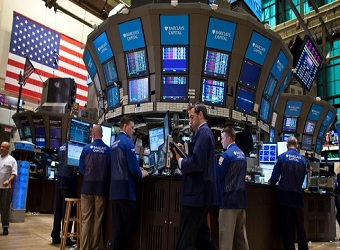The Dow Jones industrial average fell on Monday as investors worried a trade war could develop after President Donald Trump implemented tariffs on steel and aluminum imports.
The 30-stock index declined 157.13 points to close at 25,178.61, with Boeing, Caterpillar and United Technologies all falling at least 2 percent. The Dow rose more than 100 points earlier in the session as shares of Apple and Goldman Sachs reached all-time highs.
“It’s a growing concern that a mistake in trade policy could be as big as a mistake in monetary policy,” said Art Hogan, chief market strategist at B. Riley FBR.
Trump implemented a 25 percent tariff on steel imports and a 10 percent charge on aluminum imports. However, Canada and Mexico — two key U.S. trade partners — were excluded from the tariffs. But investors worried that other countries could retaliate by imposing tariffs on U.S. goods.
The S&P 500 slipped 0.1 percent to 2,783.02, with industrials dropping 1.2 percent. The Nasdaq composite climbed 0.4 percent to 7,588.32 to reach intraday and closing records as Apple recovered its losses from last month’s correction. Amazon also hit an all-time high to help lead the gains.
On Friday, the Nasdaq erased its losses the correction, surging to an all-time high after the Bureau of Labor Statistics reported better-than-expected jobs growth for last month. The S&P 500 is 3.1 percent away from recovering those losses, while the Dow is 5.4 percent away.
“At the end of the day, what matters is corporate earnings,” said Greg Powell, CEO of Fi-Plan Partners. “That’s what drives the market.” Powell also noted investors should expect more volatility moving forward, but he sees further gains ahead.
The major averages fell 10 percent from their 52-week highs last month, marking the first correction of that magnitude since 2016. The correction was sparked, in part, by fears that higher inflation would push the Federal Reserve to tighten monetary policy faster than the market expected. Inflation fears eased on Friday with the release of last month’s wage-growth numbers.
“Remember the havoc that a one-month jump in the hourly wage rate caused in January? Inflation fears were all over the media and the stock market’s correction began,” said Marc Chaikin, CEO of Chaikin Analytics. “At least for now, that’s behind us.”
The Fed is scheduled to meet next week, with most market participants expecting the central bank to raise interest rates. Market expectations for a March rate hike stood at 86 percent on Monday, according to the CME Group’s FedWatch tool.
In corporate news, David Solomon will take over as president and COO at Goldman Sachs after Harvey Schwartz, his sole competitor for the CEO position, retires next month. Goldman shares rose as much as 1.7 percent before closing 1 percent higher.
Andrew Liveris will step down from his post as executive chairman at DowDuPont in April. Jeff Fettig, co-lead independent director at DowDuPont, will take over the role upon Liveris’ departure.
Analysts at Jefferies said in a note Monday that Steven Spielberg’s “Ready Player One” movie could be a catalyst for both Nvidia and Advanced Micro Devices. In a note to clients, they said: “We believe that the movie will drive sales of VR headsets that require high-performance GPUs from NVDA and AMD.” Source: CNBC
Source: CNBC


